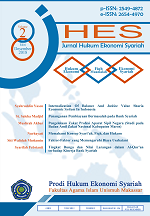Internalization Of Balance And Justice Value Sharia Economic System In Indonesia
DOI: https://doi.org/10.26618/j-hes.v2i2.1617
al Adl, al Qisth, equality, justice, maximum satisfaction
Abstract
Abstract
Indonesian Muslims in stages since the 1950s have made important changes in the economy that contains usury and has begun to change in the Islamic economy. The flow of capital and financial circulation which has been driven by conventional banking which is used to enrich one party and another party, is always faced with the flow of religious awareness of the Muslim community. The economic system used is a monopolistic economy that is involved materialistically and freedom of taste.
The purpose of this study is to provide an understanding of the sharia economic economic phenomena and the freedom of people associated with sharia principles in economics and finance in Indonesia.
By analyzing Islamic theories originating from the Qur'an and hadith and the opinions of experts, this paper aims to produce the internalization of values and balance in economic distribution. Basically, the basic values and balance in the economic system have not yet been implemented by islam, even though there are already laws on sharia banking, the law on zakat and the National Sharia Council. Efforts to literate the principles of Islamic economics have not yet tied the lowest level of society, have never been well thought out by Islamic religion.
Keywords: al Adl, al Qisth, equality, justice, maximum satisfaction
References
Abu Saud, Mahmud. 1984. Khuthuta Ra'iysiyyatu Fil iqtishadi al-Islamy, and has been translated also in English: Outlines of Islamic Economics. by Syed Ahmad Ali, Sahabat Islamic Press, Safat, Kuwait.
Ahmad, Kursyid, Prof. 1976. “Strategy Progress: Economic Development in Islamic” Framework in The Journal of Rabeta Al-Islami (Muslim Word Legue, Mecca). Vol. 3, No. 4.
Ahmad M. Saefuddin. 1987. Islamic Economy and Society in the Islamic Perspective, Jakata: Rajawali Press.
Attali, Jacques. 1997. Millennium Winners and Losers in the Coming World Order (translated form France by Leita Coners and Nathan Gardels), an Indonesian translation by Emmy Nor Hariarti with Title; The Third Millennium That Wins the Lost in the World Order Is Coming Up. I, th. 1997. Student Library: Jakarta.
At-Tukkhi, Muhammad Samad. 1992. Al Adillatu Fiqhiyah Lil ’Worship Wal Mu’amalah. Egypt: Darul I’tisham. See also H. Salim Basyarahil, Muamalah Worship in Fiqh Review. Jakarata: Gema Insani Press, 1993.
Beg, Tahir, et al. 1979. Islamics and Anti-Exploitation. in The Aligarth Magazine, Aligarth Muslim University.
Chapra, Umer. 2000. Islam and Economic Development (terj). Jakarta: Gema Insani Press.
Covey, Stephen R. 2001. Living the Seven Habits. USA: Franklin Cover, Co.
Fajri, Zul Em and Ratu Aprilia Senja, t.th. Complete Indonesian Dictionary. Jakarta: Diva Publisher.
Karim, Adiwarman A. 2001. Islamic Microeconomic, Muamalat Institute. Jakarta.
_______. 2004. History of Thought of Islamic Economics. Jakarta: PT. Raja Grafindo Persada.
Rauf, Muh. Abdul. 1979. “Islamic Doctrin of Economy”. in The Journal Rabeta Al-Islami (Muslim World Lague, Mecca) Vol 4, No. 4.
Downloads
Published
Issue
Section
License
Dalam hal artikel diterima oleh Tim Editorial Jurnal Hukum Ekonomi Syariah, dengan nomor terdaftar ISSN 2549-4872 (print), ISSN 2654-4970 (Online) dan Penulis mempertahankan hak cipta dan memberikan jurnal hak publikasi pertama dengan karya yang secara bersamaan dilisensikan di bawah Lisensi Atribusi Creative Commons yang memungkinkan orang lain untuk berbagi karya dengan pengakuan atas kepenulisan karya dan publikasi awal dalam jurnal ini.
Prodi Hukum Ekonomi Syariah, Fakultas Agama Islam, Universitas Muhammadiyah Makassar sebagai penerbit Jurnal Hukum Ekonomi Syariah, dengan nomor terdaftar ISSN 2549-4872 (print), ISSN 2654-4970 (Online) memegang hak publikasi pertama semua artikel yang diterbitkan dalam jurnal ini.
Prodi Hukum Ekonomi Syariah, Fakultas Agama Islam, Universitas Muhammadiyah Makassar memiliki hak untuk mereproduksi dan mendistribusikan artikel dan penulis tidak diizinkan untuk menerbitkan artikel yang sama yang diterbitkan dalam jurnal ini.
Pernyataan Keaslian dan Naskah Hak Cipta dapat diunduh: di sini
Setelah mengisi surat pernyataan, silakan kirim via email: jurnal.hes@gmail.com
License:
Jurnal Hukum Ekonomi Syariah is licensed under a Creative Commons Attribution-ShareAlike 4.0 International License. View My Stats
Authors are free to:
Share: copy and redistribute the material in any medium or format
Adapt: remix, transform, and build upon the material for any purpose, even commercially.
The licensor cannot revoke these freedoms as long as you follow the license terms. which include the following:
Attribution: You must give appropriate credit, provide a link to the license, and indicate if changes were made. You may do so in any reasonable manner, but not in any way that suggests the licensor endorses you or your use.
ShareAlike: If you remix, transform, or build upon the material, you must distribute your contributions under the same license as the original.





